Overview
Empathetic advertisement ideas can significantly elevate marketing campaigns by fostering emotional connections with target audiences. We understand that in today’s fast-paced world, creating a bond with consumers is more important than ever. This article emphasizes that by incorporating empathy, storytelling, and user-generated content, businesses can lead to increased engagement and loyalty. Emotional resonance often outweighs rational considerations in consumer decision-making, reminding us that we are all driven by our feelings and experiences.
Introduction
In the rapidly evolving landscape of advertising, we understand that connecting with consumers on an emotional level has never been more crucial. As brands navigate the complexities of a digital marketplace, they are increasingly turning to empathy, storytelling, and authenticity to resonate with their audiences. With a staggering 83% of marketers recognizing the power of emotional engagement, it’s clear that strategies emphasizing genuine connections are poised to redefine how brands communicate.
Have you ever felt that a brand truly understands you? From leveraging user-generated content to crafting compelling narratives, the focus is shifting towards building relationships that foster loyalty and trust. As we look ahead to 2025, we recognize that understanding these dynamics will be essential for brands aiming to thrive in a competitive environment where consumer preferences are continuously evolving. Together, we can navigate this journey toward deeper connections and meaningful engagement.
Understanding Empathy in Advertising
Empathy in advertising is fundamentally about companies understanding and sharing the emotions of their target audience while generating effective advertisement ideas. In our increasingly digital marketplace, consumers are drawn to companies that genuinely acknowledge their feelings and experiences. As Francis Jude Alcantara wisely states, “As you develop your next promotional strategy, remember to keep your identity genuine and relatable to gain more patrons and, eventually, more profit.”
Recent insights reveal that:
- An impressive 83% of marketers believe emotional strategies significantly enhance campaign engagement and drive sales.
- Additionally, 69% of B2B marketers view identity development and human-centric marketing as a competitive advantage, underscoring the importance of empathy in advertising.
By incorporating empathy into their advertisement ideas, organizations can create messages that are not only relatable but also profoundly impactful, fostering a sense of community and connection with their audience.
This emotional resonance is crucial, as studies indicate that emotions often outweigh rational considerations in consumer decision-making. Brands that successfully demonstrate empathy in their campaigns can cultivate stronger loyalty. For instance, case studies show that advertisements utilizing humor lead to an 82% increase in the likelihood of repeat purchases, highlighting the effectiveness of humor in enhancing customer loyalty.
As we look ahead to 2025, the role of empathy in advertisement ideas will undoubtedly become even more critical, establishing it as an essential element of effective marketing strategies.
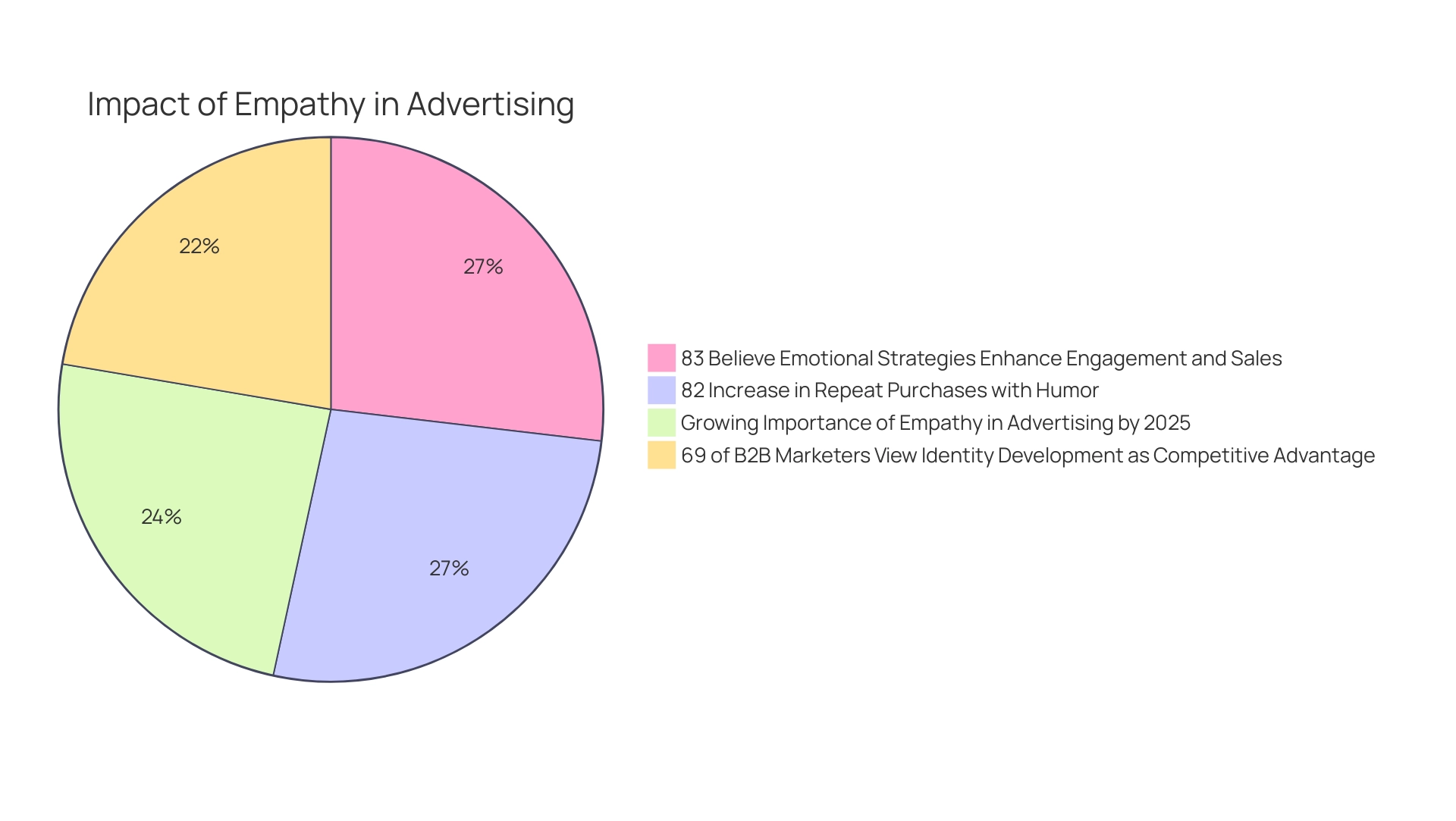
Harnessing the Power of Storytelling
In the realm of advertising, storytelling emerges as a powerful tool that creates advertisement ideas designed to captivate audiences and stir emotions. We understand that brands excelling in the art of storytelling can forge profound emotional bonds with their audience, making their messages more impactful and unforgettable. For instance, an attorney might share a poignant narrative about how their legal services transformed a client’s life, effectively showcasing the value they offer in a relatable manner.
As Claire Mulligan points out, in 2023, social media usage statistics reveal how much individuals rely on social platforms to connect with others online and explore products and services. This trend suggests a rising preference for authenticity in product narratives. Notably, research from 2024 highlights that:
- 62% of Gen Z shoppers favor companies that emphasize sustainability, inclusion, and diversity, demonstrating a significant shift toward value-driven purchasing.
- 71% of UK shoppers trust companies, which enhances their purchasing behavior and underscores the effectiveness of innovative advertisement ideas.
Additionally, the gender dynamics in visual storytelling engagement reveal that women constitute 57% of those interacting with emotional content online, compared to 43% of men. This indicates the necessity for companies to tailor their narratives accordingly. The ethical considerations in advertising are also paramount; employing techniques such as k-anonymity and differential privacy can help safeguard client data while fostering trust.
As we look toward 2025, storytelling will undoubtedly serve as a key differentiator for companies striving to engage with their audiences on a more profound level. This is particularly crucial in the legal sector, where advertisement ideas focused on establishing trust and relatability are paramount. The case study titled ‘Brand Values & Trust Influence Purchasing Decisions‘ further illustrates this point, highlighting that shoppers are increasingly willing to support companies that prioritize ethical values. This reinforces the significance of narrative in building loyalty, reminding us that you are not alone in seeking meaningful connections.
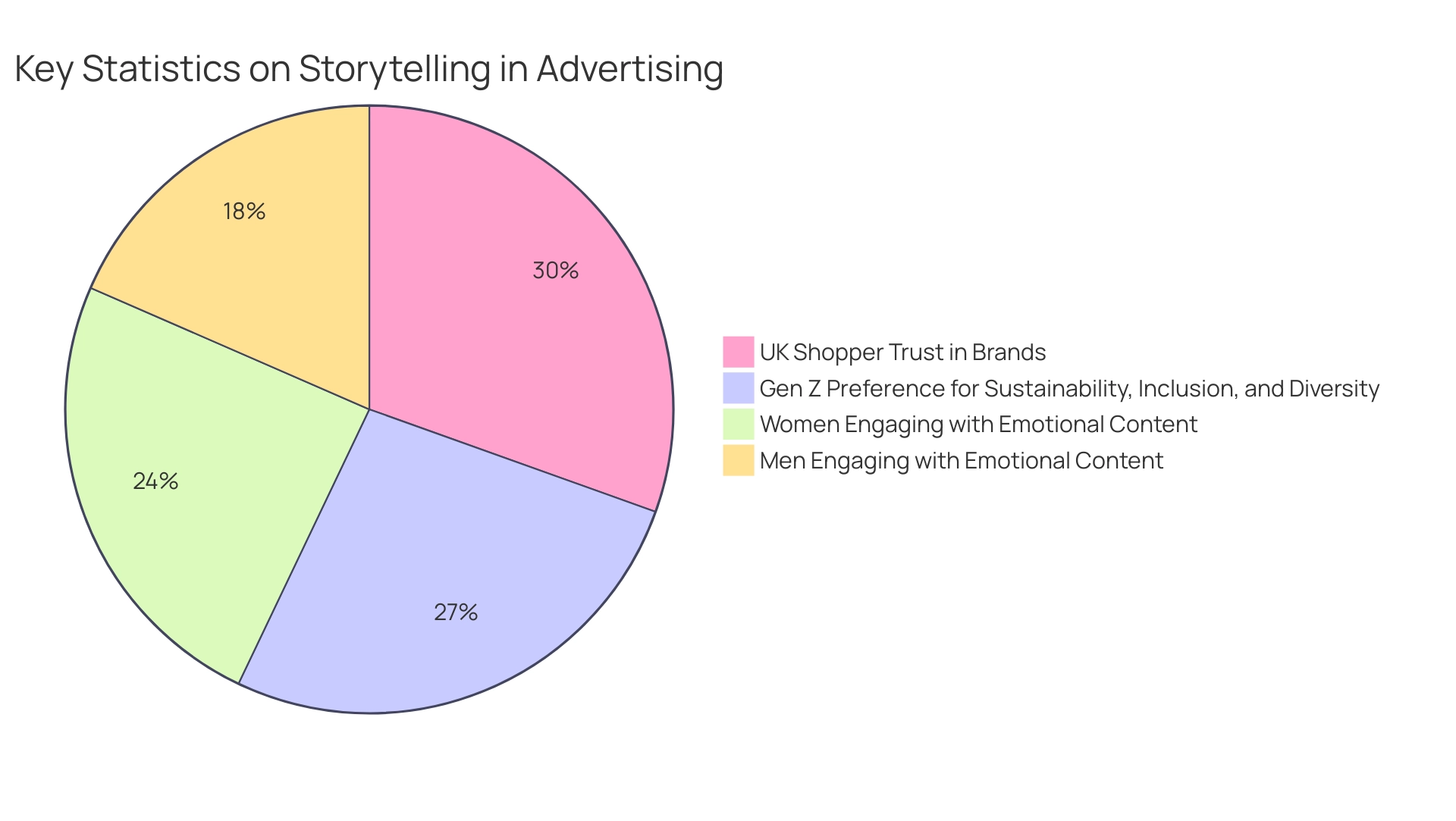
Leveraging User-Generated Content for Authenticity
User-generated content (UGC) encompasses any material crafted by consumers, including reviews, testimonials, and social media posts, rather than being produced by companies themselves. This type of content is increasingly vital for businesses as it showcases genuine customer experiences, which can significantly bolster credibility. Imagine companies encouraging their customers to share personal stories or photographs featuring their products; this not only fosters a sense of community but also builds trust among potential clients.
As we navigate a landscape that increasingly values authenticity, companies that effectively blend advertisement ideas with user-generated content in their marketing strategies will find themselves better equipped to connect with their audiences in 2025. Did you know that CrowdRiff customers typically enjoy approval rates for UGC rights between 60-70%? This statistic highlights the tangible impact of UGC on engagement. Experts also emphasize that, unlike traditional branded content, UGC feels authentic, igniting conversations and creating a ripple effect that broadens reach.
In platforms like TikTok—where users engage for over an hour daily—leveraging UGC is not merely beneficial; it is essential for businesses striving to cultivate meaningful connections in an increasingly competitive marketplace. Moreover, the rise of LinkedIn, with its over 1 billion members, offers a unique opportunity for B2B companies to effectively utilize UGC, particularly in light of recent career transitions. By focusing on authenticity and community building, brands can not only enhance their credibility but also drive significant ROI. This makes advertisement ideas that incorporate UGC a crucial component of modern promotional strategies. You are not alone in seeking ways to connect and engage; together, we can explore the power of UGC to transform your approach to marketing.
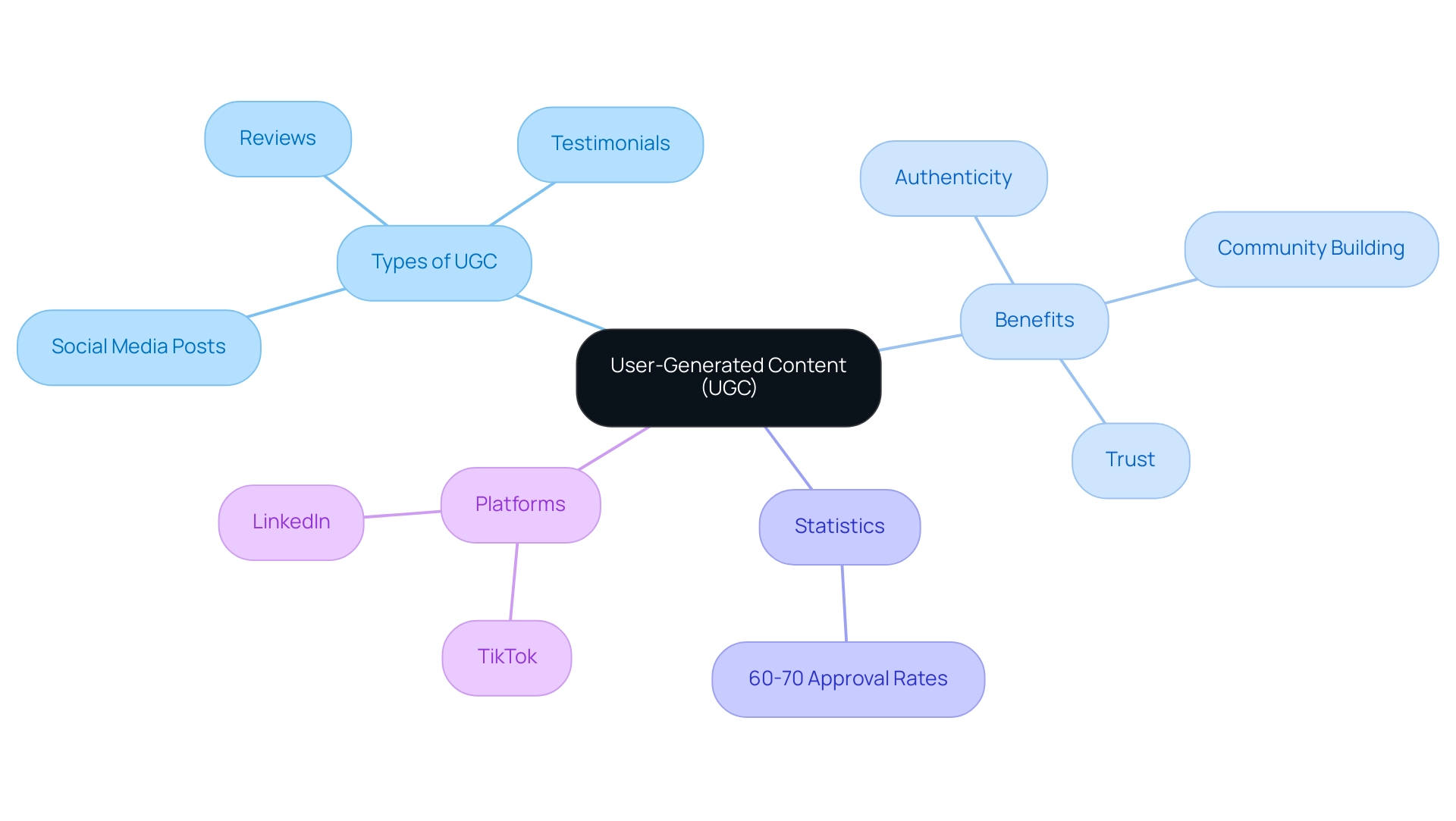
Crafting Emotional Narratives in Your Ads
Crafting emotional narratives in advertisement ideas serves as a powerful strategy that connects deeply with audiences by resonating with their feelings and personal experiences. In fact, did you know that 31% of advertisements are emotion-based? This statistic highlights the prevalence of this heartfelt approach in the marketing landscape. Brands that effectively evoke emotions—such as joy, nostalgia, or empathy—can leave a lasting impression.
Consider this: a company may depict a heartfelt story about a family using its product during a significant life event. This establishes a personal connection that enhances viewer engagement, making the experience resonate on a deeper level. Recent studies indicate that 71% of digital marketers prioritize advertisement ideas that build emotional connections. They recognize that these bonds not only enhance recognition but also foster loyalty. As highlighted by Statista, 71% of marketers concentrate on creating emotional connections to enhance their identities’ memorability.
According to the Harvard Business Review, customers who share an emotional connection with a product are 52% more valuable than those who are merely satisfied. This reinforces the idea that emotional promotion is not just a trend; it’s a crucial element for long-term success. This case study underscores the value of fostering emotional connections over mere satisfaction. As we progress into 2024, the focus on emotional storytelling in marketing continues to grow. Successful advertisement ideas show that connecting with audiences on an emotional level greatly enhances their support for the company. You are not alone in this journey—embracing emotional narratives can truly transform your marketing efforts.
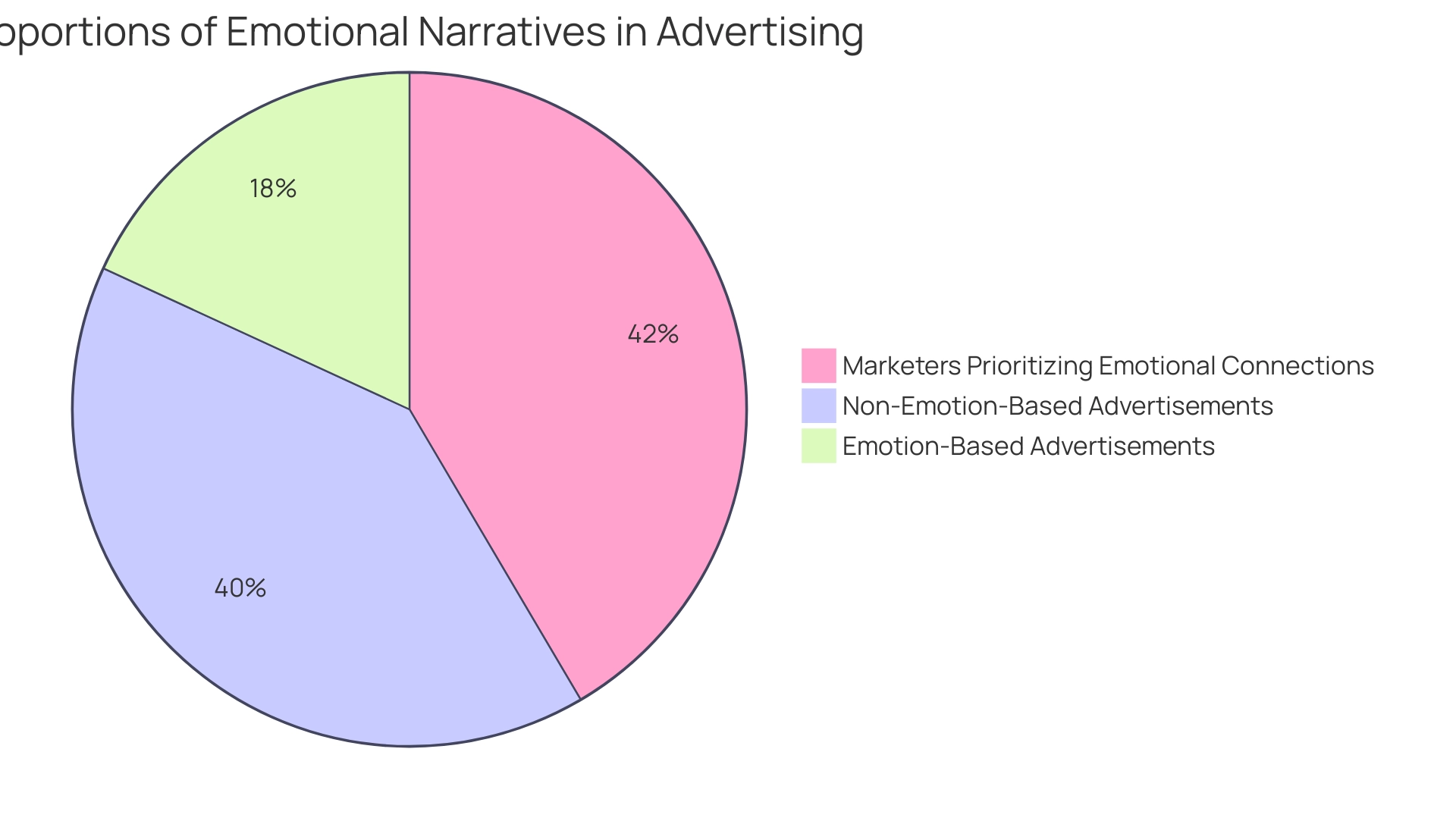
Engaging Audiences with Interactive Content
Interactive content, such as quizzes, polls, and games, plays a pivotal role in enhancing audience participation and engagement. We understand that this type of content allows individuals to connect more deeply with companies, creating immersive experiences that foster a sense of community. For instance, a company might design a quiz that helps users discover which product best meets their specific needs, blending entertainment with valuable insights for shoppers.
As we look towards 2025, the effectiveness of interactive content becomes increasingly evident. Brands that embrace these strategies are likely to experience significantly higher engagement rates. This trend aligns with recent statistics projecting that ad spending in digital audio advertising will exceed $10 billion in 2023, illustrating a broader shift towards formats that prioritize audience interaction. Furthermore, TikTok generated $4 billion in advertising revenue in 2022, with expectations to double by 2024, underscoring the growing importance of interactive content in a swiftly evolving digital landscape.
Moreover, with 48% of Snapchat users aged 15-25, tapping into interactive experiences is essential for engaging younger demographics. By prioritizing interactive content, companies can not only enhance engagement but also develop advertising ideas that resonate with the evolving preferences of consumers for dynamic formats. It is noteworthy that only 37% of B2C marketers have a documented strategy, highlighting the urgent need for companies to invest in interactive content as a vital component of their overall engagement approach.
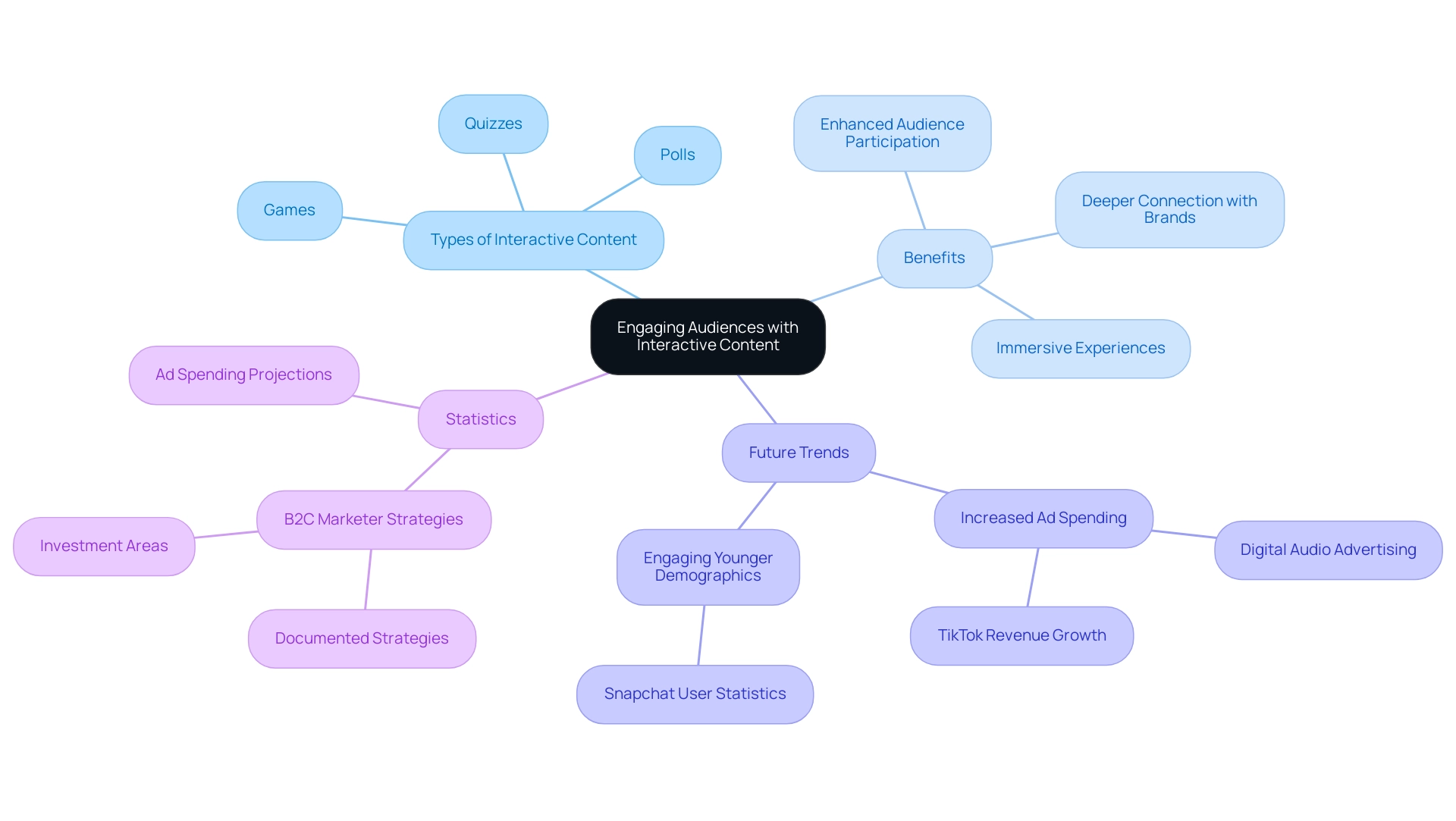
Partnering with Influencers for Greater Reach
Collaborating with influencers offers companies a unique opportunity to connect with established audiences and significantly broaden their reach. Did you know that 36% of millennials worldwide find influencer recommendations more trustworthy than traditional advertisements? This credibility can genuinely enhance a company’s message. For example, a cosmetics brand might partner with a beloved beauty influencer to authentically showcase its products, fostering a relatable connection with potential customers.
Consider the inspiring journey of Jordan Ferney with her blog, Oh Happy Day. Not only did she cultivate a substantial following, but she also launched her online party supply store, demonstrating how influencer promotion can drive e-commerce growth. As the world of influencer marketing evolves, companies that thoughtfully align with influencers who share their values are more likely to experience increased engagement and loyalty. When selecting the right influencer, it’s essential to consider factors like follower demographics, engagement rates, and how well the influencer’s mission aligns with your organization’s goals.
According to the Influencer Marketing Hub, Instagram is the second-best channel for influencer marketing, making it a crucial platform to explore in 2024. The impact of these partnerships on reach is profound. When companies collaborate with the right influencers, they can create innovative advertisement ideas that resonate with new audiences, nurturing lasting connections and ultimately amplifying their brand awareness. Remember, you are not alone in navigating this landscape; there are supportive strategies available to help you thrive.
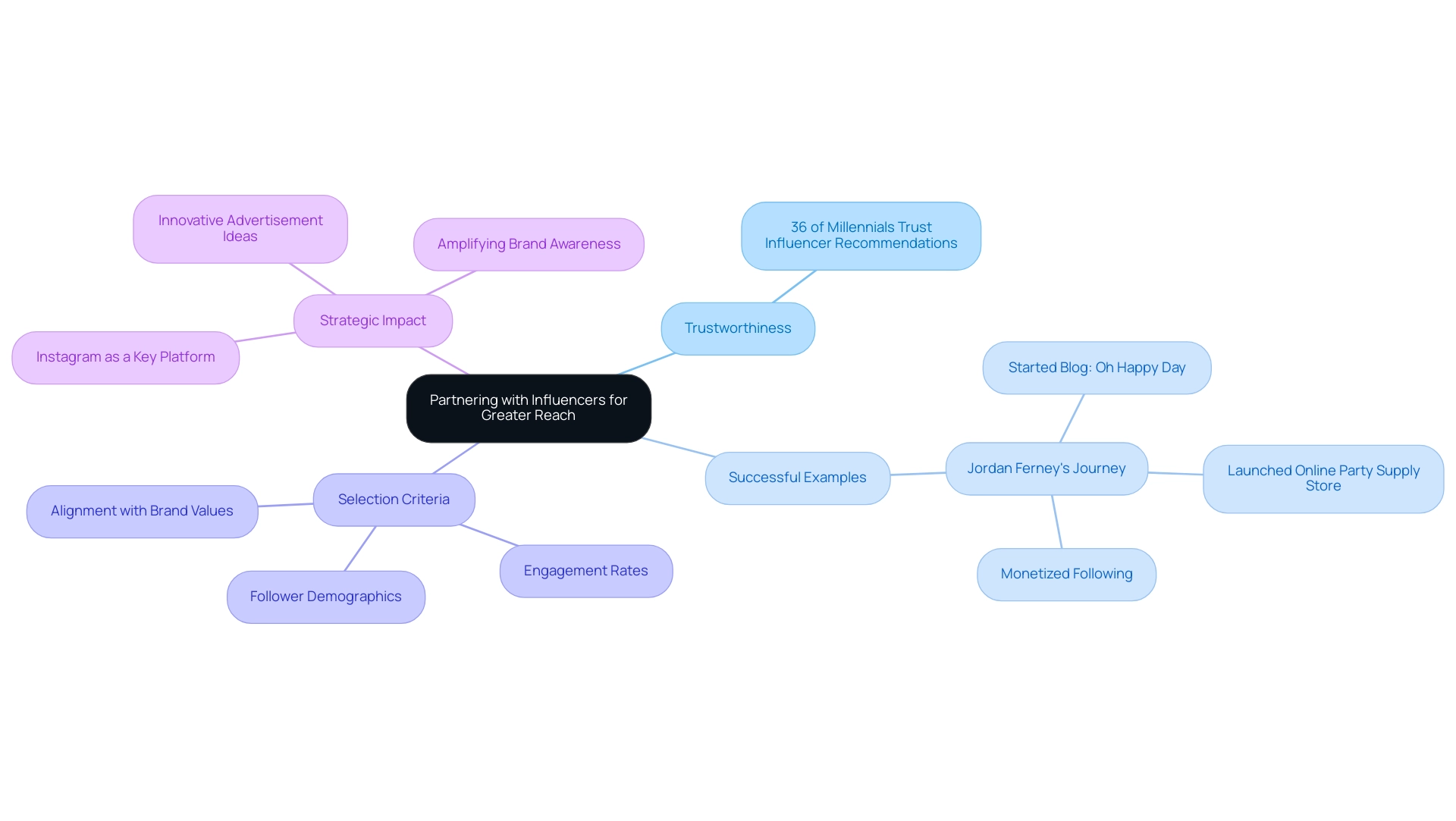
Aligning Your Brand with Social Causes
Aligning your identity with social causes not only shows your dedication to corporate social responsibility but can also significantly enhance your reputation. In 2024, consumers are increasingly favoring companies that actively engage with social issues that resonate with them. For instance, clothing companies that promote environmental sustainability appeal to a growing group concerned about the planet’s well-being.
Have you ever felt the impact of a brand that stands for something meaningful? A recent survey reveals that over 85% of customers desire proactive communication from businesses, highlighting the importance of taking clear stands on relevant issues. By providing solutions before customers express concerns, companies can foster loyalty, building trust and rapport with their audience. As we approach 2025, demonstrating genuine support for social causes allows companies to cultivate deeper connections, enhancing their overall image.
Moreover, statistics indicate that 13% of companies struggle to enforce their guidelines, presenting a unique opportunity for those who adhere strictly to their values to shine in a competitive market. As Business Insider notes, the amount spent on logo design can range from nothing to millions, underscoring the critical role of identity in relation to social causes. Furthermore, a case study by Sprout Social revealed that 89% of individuals are likely to purchase from companies they follow on social media, illustrating how effective involvement with social issues can boost sales and loyalty.
This alignment not only encourages loyalty but also positions companies favorably within public awareness. Remember, you are not alone in navigating these challenges; together, we can embrace the power of purpose-driven identity.
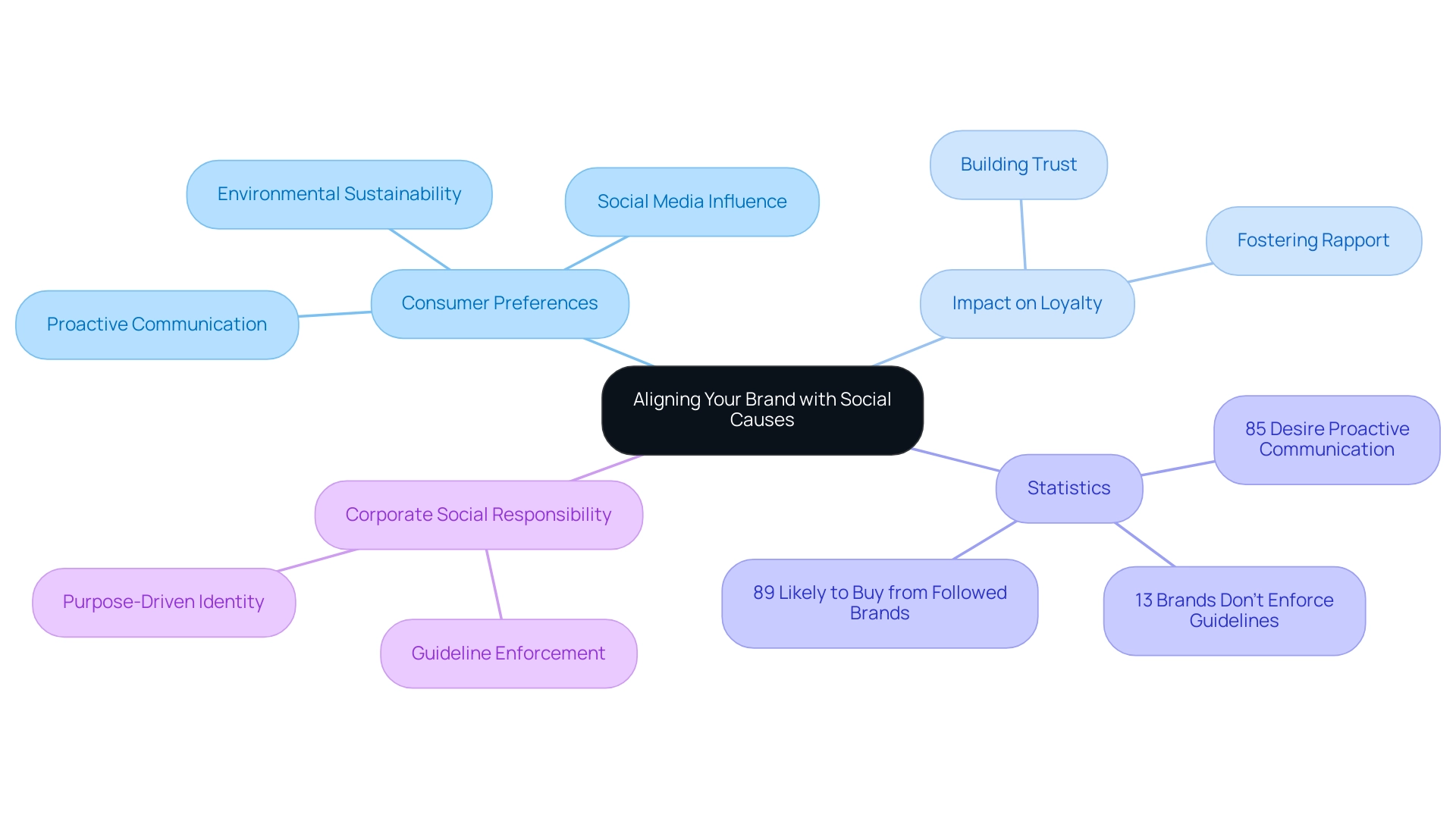
Personalizing Your Marketing Approach
Customizing marketing strategies for individual clients is a cornerstone of effective advertisement ideas today. We understand that personalization—customizing messages and offers based on specific customer preferences and behaviors—can significantly enhance the connection between brands and their audiences. By harnessing data insights, companies can create advertisement ideas that truly resonate with their audience, fostering a sense of understanding and care.
Imagine an online retailer enhancing customer experience by sending personalized product recommendations grounded in previous purchases. In 2024, studies indicate that 72% of luxury buyers prioritize personalization, underscoring the growing expectation for tailored experiences that make customers feel valued. However, the removal of third-party cookie tracking presents challenges for companies striving to achieve this level of personalization in a cookieless environment, leaving many to wonder how they can adapt.
As companies navigate a landscape increasingly defined by consumer demands and privacy concerns—42% of consumers express worry about their online data—they must develop advertisement ideas that effectively address these issues in their promotional strategies. You are not alone in feeling this uncertainty. Notably, LinkedIn reports that users exposed to promotional messages on their platform are six times more likely to convert, emphasizing the profound impact of effective personalization. With content marketing revenue expected to reach a staggering 85.6 billion U.S. dollars, prioritizing personalized marketing initiatives is not merely advantageous but essential for success in the competitive landscape of 2025. Together, we can embrace these challenges and turn them into opportunities for growth.
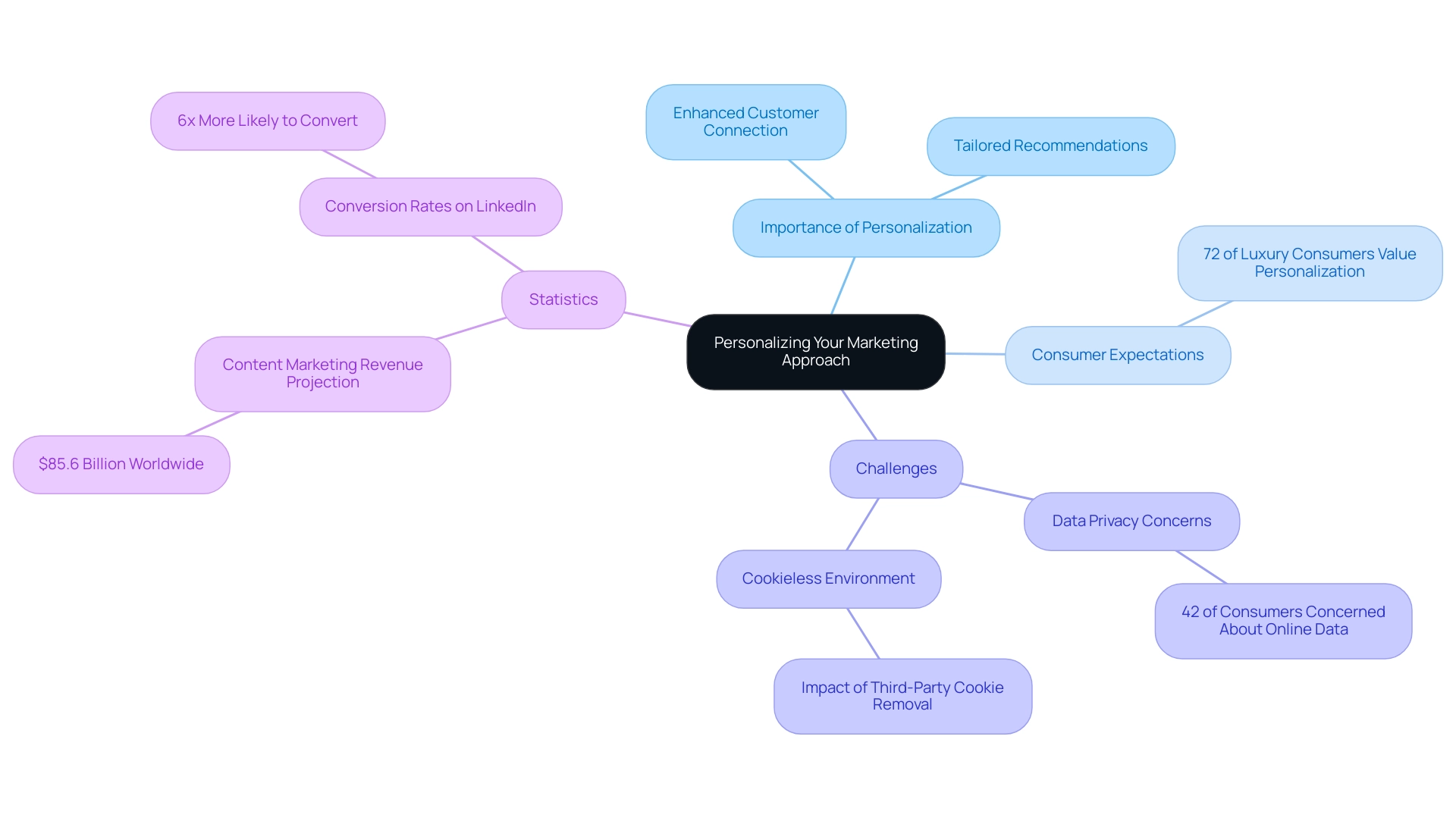
Using Humor to Create Memorable Ads
Integrating humor into advertisement ideas can foster lasting relationships with customers and significantly enhance product recall. Humorous advertisements often evoke positive feelings, making viewers more inclined to remember the associated brand name. Research indicates that 80% of buyers are more likely to repurchase from a company that employs humor in its advertising, reinforcing the idea that laughter resonates with audiences.
Consider the recent example of Hellmann’s ‘Mayo Cat,’ where a Siberian cat named Munchkin captured hearts and went viral due to its amusing connection to mayonnaise. This illustrates how lighthearted content can truly captivate attention. As we look ahead to 2024, experts like author and podcaster Gretchen Rubin remind us that while humor can effectively drive sales, many industry leaders approach its application with caution. CeraVe’s latest culture-hacking campaign exemplifies this trend, skillfully integrating ‘medutainment’ with popular culture through platforms like ‘SNL.’
This campaign successfully engaged audiences by merging entertainment with messaging, showcasing how humor can strengthen connections and foster positive associations. Furthermore, the upcoming webinar hosted by GroupBy, Grid Dynamics, and Google Cloud will delve into next-gen eCommerce search and product discovery solutions, emphasizing the importance of innovative strategies, including humor, in enhancing consumer engagement. As companies continue to harness the power of humor, those who do so effectively are likely to experience increased engagement and loyalty well into 2025. You are not alone in this journey; together, we can explore how these strategies can resonate with your audience and elevate your brand.
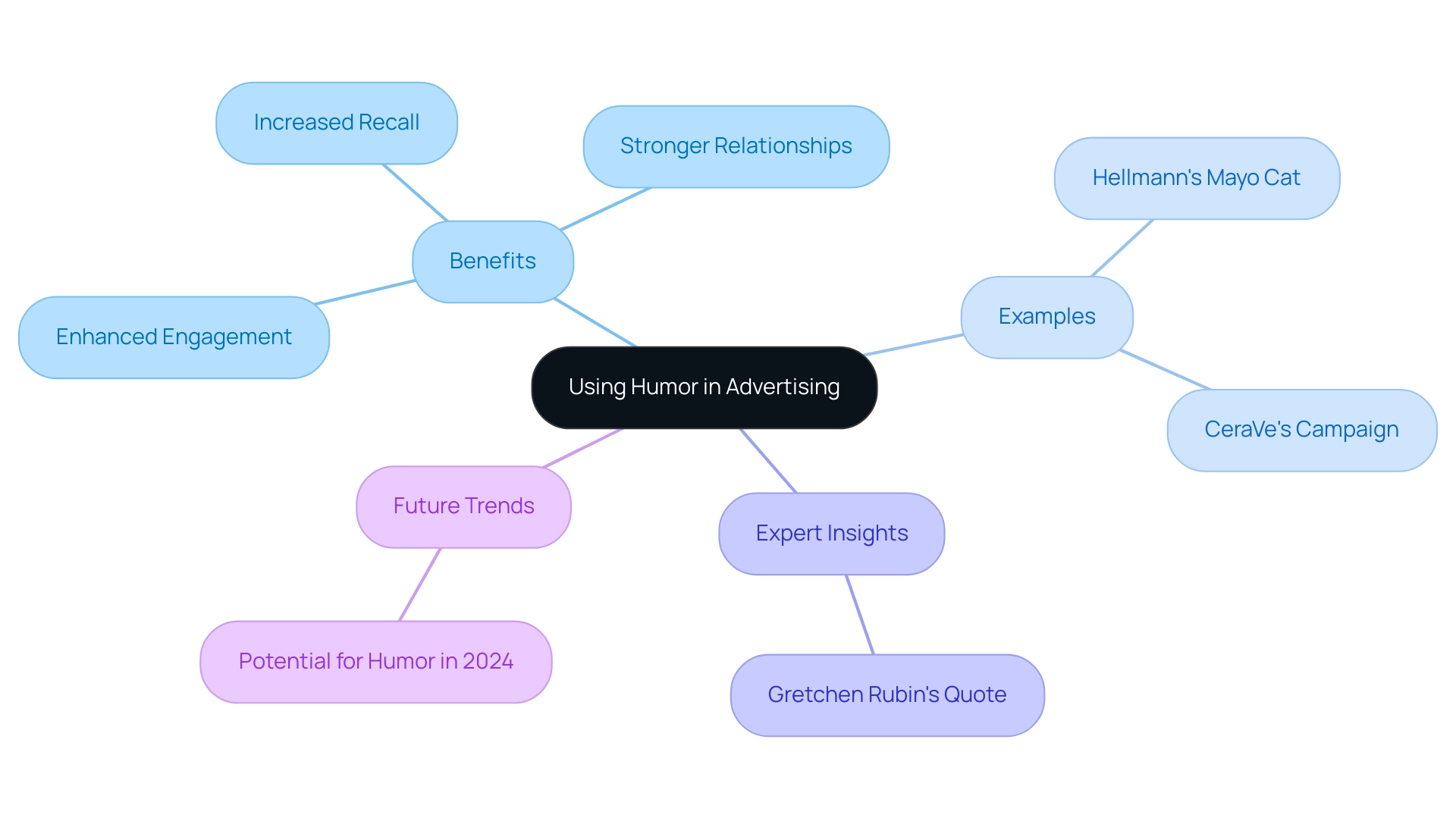
Adapting Your Campaigns Based on Audience Feedback
Adapting advertisement ideas in response to audience feedback is crucial for brands that genuinely care about staying relevant and effective in today’s competitive landscape. With 40% of companies increasing their investment in digital promotion, understanding buyer preferences has never been more vital. We understand that gathering insights can feel overwhelming, but tools such as surveys can provide valuable feedback that helps in developing effective advertisement ideas and refining messaging and campaign strategies.
Significantly, companies that embrace customer feedback are not just maintaining relevance; they are driving success. For instance, research shows that:
- 78% of businesses embracing social selling outperform their peers.
- Companies prioritizing feedback are 51% more likely to achieve their sales goals.
As we approach 2025, brands that are dedicated to adapting based on consumer insights will likely foster stronger relationships and enhance their advertisement ideas, ultimately improving marketing effectiveness.
In fact, as Wyzowl reports, 92% of video marketers indicate that video advertising yields a strong ROI, demonstrating the tangible benefits of strategies informed by consumer insights. The latest trends in 2024 highlight that those who actively engage with their audience through feedback will not only adapt but thrive in the ever-evolving world of advertisement ideas. Remember, you are not alone in this journey; together, we can navigate these changes and find success.
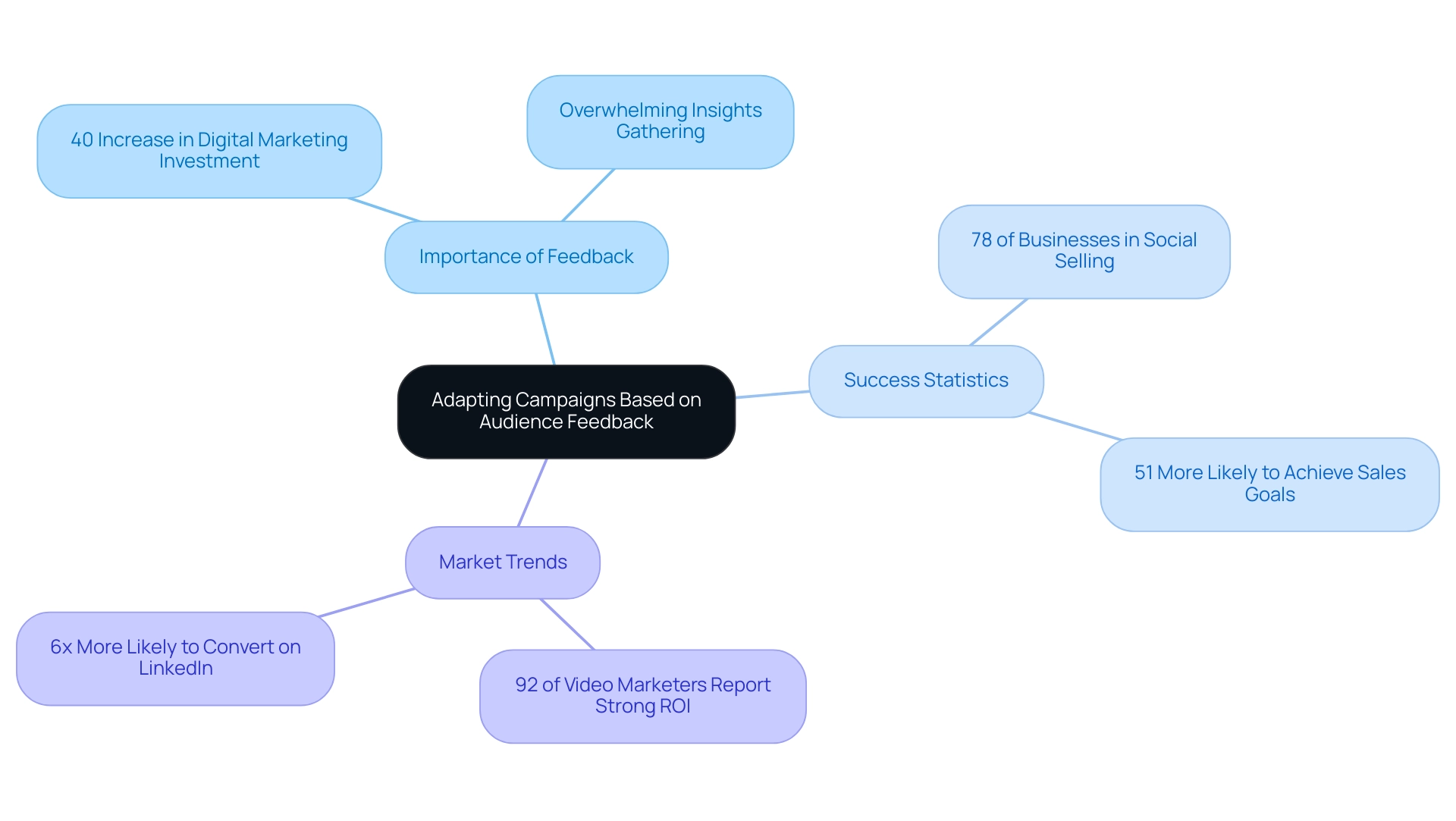
Conclusion
Establishing genuine connections with consumers is increasingly vital in today’s advertising landscape. We understand that by prioritizing empathy, brands can resonate deeply with their audience’s emotions, fostering loyalty and engagement. The integration of storytelling into marketing strategies enhances this connection, allowing brands to present relatable narratives that not only capture attention but also build trust. Furthermore, leveraging user-generated content adds an authentic touch, showcasing real customer experiences and fostering a sense of community.
As we look towards 2025, the emphasis on personalization and interactive content will be essential to meet the evolving preferences of consumers. Tailoring messages and utilizing feedback will drive relevance and effectiveness, ensuring that campaigns align with your expectations. Additionally, incorporating humor and aligning with social causes can significantly enhance brand recall and reputation, ultimately fostering lasting consumer relationships.
In a world where consumers are increasingly discerning, the ability to adapt and engage through emotional resonance, storytelling, and authenticity will define successful marketing strategies. Brands that embrace these elements will not only thrive in a competitive environment but will also create meaningful connections that resonate long after the advertisement has ended. Remember, you are not alone in this journey; together, we can navigate these changes and build a more connected future.


